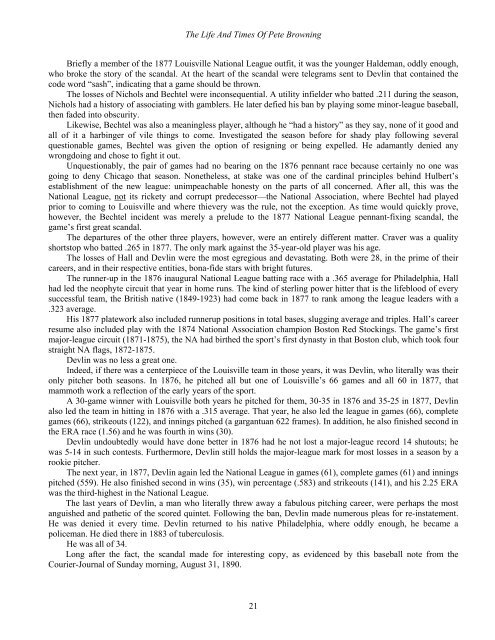AMERICAN GLADIATOR: The Life And Times Of ... - The Book Locker
AMERICAN GLADIATOR: The Life And Times Of ... - The Book Locker
AMERICAN GLADIATOR: The Life And Times Of ... - The Book Locker
You also want an ePaper? Increase the reach of your titles
YUMPU automatically turns print PDFs into web optimized ePapers that Google loves.
<strong>The</strong> <strong>Life</strong> <strong>And</strong> <strong>Times</strong> <strong>Of</strong> Pete Browning<br />
Briefly a member of the 1877 Louisville National League outfit, it was the younger Haldeman, oddly enough,<br />
who broke the story of the scandal. At the heart of the scandal were telegrams sent to Devlin that contained the<br />
code word “sash”, indicating that a game should be thrown.<br />
<strong>The</strong> losses of Nichols and Bechtel were inconsequential. A utility infielder who batted .211 during the season,<br />
Nichols had a history of associating with gamblers. He later defied his ban by playing some minor-league baseball,<br />
then faded into obscurity.<br />
Likewise, Bechtel was also a meaningless player, although he “had a history” as they say, none of it good and<br />
all of it a harbinger of vile things to come. Investigated the season before for shady play following several<br />
questionable games, Bechtel was given the option of resigning or being expelled. He adamantly denied any<br />
wrongdoing and chose to fight it out.<br />
Unquestionably, the pair of games had no bearing on the 1876 pennant race because certainly no one was<br />
going to deny Chicago that season. Nonetheless, at stake was one of the cardinal principles behind Hulbert’s<br />
establishment of the new league: unimpeachable honesty on the parts of all concerned. After all, this was the<br />
National League, not its rickety and corrupt predecessor—the National Association, where Bechtel had played<br />
prior to coming to Louisville and where thievery was the rule, not the exception. As time would quickly prove,<br />
however, the Bechtel incident was merely a prelude to the 1877 National League pennant-fixing scandal, the<br />
game’s first great scandal.<br />
<strong>The</strong> departures of the other three players, however, were an entirely different matter. Craver was a quality<br />
shortstop who batted .265 in 1877. <strong>The</strong> only mark against the 35-year-old player was his age.<br />
<strong>The</strong> losses of Hall and Devlin were the most egregious and devastating. Both were 28, in the prime of their<br />
careers, and in their respective entities, bona-fide stars with bright futures.<br />
<strong>The</strong> runner-up in the 1876 inaugural National League batting race with a .365 average for Philadelphia, Hall<br />
had led the neophyte circuit that year in home runs. <strong>The</strong> kind of sterling power hitter that is the lifeblood of every<br />
successful team, the British native (1849-1923) had come back in 1877 to rank among the league leaders with a<br />
.323 average.<br />
His 1877 platework also included runnerup positions in total bases, slugging average and triples. Hall’s career<br />
resume also included play with the 1874 National Association champion Boston Red Stockings. <strong>The</strong> game’s first<br />
major-league circuit (1871-1875), the NA had birthed the sport’s first dynasty in that Boston club, which took four<br />
straight NA flags, 1872-1875.<br />
Devlin was no less a great one.<br />
Indeed, if there was a centerpiece of the Louisville team in those years, it was Devlin, who literally was their<br />
only pitcher both seasons. In 1876, he pitched all but one of Louisville’s 66 games and all 60 in 1877, that<br />
mammoth work a reflection of the early years of the sport.<br />
A 30-game winner with Louisville both years he pitched for them, 30-35 in 1876 and 35-25 in 1877, Devlin<br />
also led the team in hitting in 1876 with a .315 average. That year, he also led the league in games (66), complete<br />
games (66), strikeouts (122), and innings pitched (a gargantuan 622 frames). In addition, he also finished second in<br />
the ERA race (1.56) and he was fourth in wins (30).<br />
Devlin undoubtedly would have done better in 1876 had he not lost a major-league record 14 shutouts; he<br />
was 5-14 in such contests. Furthermore, Devlin still holds the major-league mark for most losses in a season by a<br />
rookie pitcher.<br />
<strong>The</strong> next year, in 1877, Devlin again led the National League in games (61), complete games (61) and innings<br />
pitched (559). He also finished second in wins (35), win percentage (.583) and strikeouts (141), and his 2.25 ERA<br />
was the third-highest in the National League.<br />
<strong>The</strong> last years of Devlin, a man who literally threw away a fabulous pitching career, were perhaps the most<br />
anguished and pathetic of the scored quintet. Following the ban, Devlin made numerous pleas for re-instatement.<br />
He was denied it every time. Devlin returned to his native Philadelphia, where oddly enough, he became a<br />
policeman. He died there in 1883 of tuberculosis.<br />
He was all of 34.<br />
Long after the fact, the scandal made for interesting copy, as evidenced by this baseball note from the<br />
Courier-Journal of Sunday morning, August 31, 1890.<br />
21
















